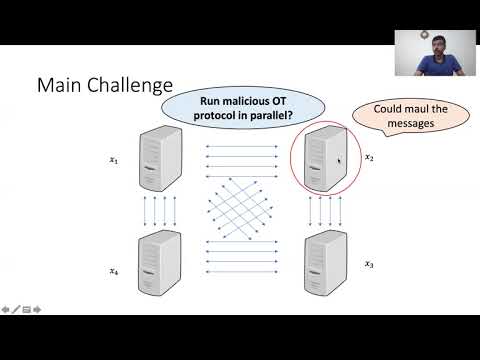CryptoDB
On the Round Complexity of Black-Box Secure MPC
| Authors: |
|
|---|---|
| Download: |
|
| Conference: | CRYPTO 2021 |
| Abstract: | We consider the question of minimizing the round complexity of secure multiparty computation (MPC) protocols that make a black-box use of simple cryptographic primitives in the setting of security against any number of malicious parties. In the plain model, previous black-box protocols required a high constant number of rounds (>15). This is far from the known lower bound of 4 rounds for protocols with black-box simulators. When allowing a random oblivious transfer (OT) correlation setup, 2-round protocols making a black-box use of a pseudorandom generator were previously known. However, such protocols were obtained via a round-collapsing ``protocol garbling'' technique that has poor concrete efficiency and makes a non-black-box use of an underlying malicious-secure protocol. We improve this state of affairs by presenting the following types of black-box protocols. a. 4-round ``pairwise MPC'' in the plain model. This round-optimal protocol enables each ordered pair of parties to compute a function of both inputs whose output is delivered to the second party. The protocol makes black-box use of any public-key encryption (PKE) with pseudorandom public keys. As a special case, we get a black-box round-optimal realization of secure (copies of) OT between every ordered pair of parties. b. 2-round MPC from OT correlations. This round-optimal protocol makes a black-box use of any general 2-round MPC protocol satisfying an augmented notion of semi-honest security. In the two-party case, this yields new kinds of 2-round black-box protocols. c. 5-round MPC in the plain model. This protocol makes a black-box use of PKE with pseudorandom public keys, and 2-round oblivious transfer with ``semi-malicious'' security. A key technical tool for the first result is a novel combination of split-state non-malleable codes (Dziembowski, Pietrzak, and Wichs, JACM '18) with standalone secure {\em two-party} protocols. The second result is based on a new round-optimized variant of the ``IPS compiler'' (Ishai, Prabhakaran and Sahai, Crypto '08). The third result is obtained via a specialized combination of these two techniques. |
Video from CRYPTO 2021
BibTeX
@inproceedings{crypto-2021-31235,
title={On the Round Complexity of Black-Box Secure MPC},
publisher={Springer-Verlag},
doi={10.1007/978-3-030-84245-1_8},
author={Yuval Ishai and Dakshita Khurana and Amit Sahai and Akshayaram Srinivasan},
year=2021
}

